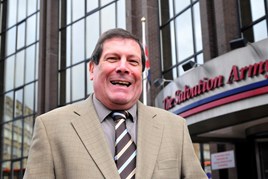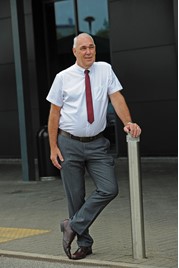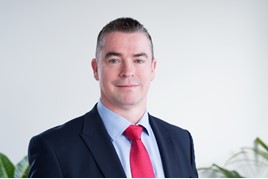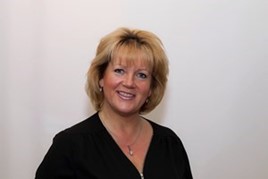The vehicles have changed over the past 40 years but fleet managers agree that relationships - with drivers, suppliers and manufacturers - remain essential to successful fleet management. Sarah Tooze reports
Fact File

Name: Peter Bonney
First fleet/automotive role: assistant at leasing company
Year: 1973
Current role: retired
Year retired: 2017
Fact File

Name: Graham Telfer
First fleet/automotive role: apprentice at the National Bus Company
Year: 1974
Current role: fleet manager at Gateshead Council
Fact File

Name: John Pryor
First fleet/automotive role: facilities manager at Burton Group Fleet
Year: 1991
Current role: Group mobility manager, Arcadia Group
Fact File

Name:Stuart Wiseman
First fleet/automotive role: transport clerk at LGH Storage
Year: 1979
Current role: group fleet manager at Nationwide Window Cleaning
Fact File

Name: Larry Bannon
First fleet/automotive role: transport manager at City of Scarborough, Ontario, Canada
Year: 1979
Current role: retired
Year retired: 2017
Fact File

Name: Dermot Coughlan
First fleet/automotive role: fleet administrator at Kelly Group
Year: 1991
Current role: fleet director at Kelly Group
Fact File

Name: Paul Holmes
First fleet/automotive role: mechanic, British Gas
Year: 1982
Current role: MD, Fleet Managers Friend
Fact File

Name: Liz Hollands
First fleet/automotive role: fleet manager at DTZ
Year: 1993
Current role: executive assistant to CEO and car fleet manager at Freight Transport Association
Fact File

Name: Phil Redman
First fleet/automotive role: fleet manager at IBM UK
Year: 1994
Current role: retired
Year retired: 2015
Fact File

Name: Phil Clifford
First fleet/automotive role: technician (mechanical and transport) – aka fleet administrator at Broxtowe Borough Council
Year: 1977
Current role: fleet consultant/semi-retired
Year retired: 2018
Fact File

Name: Caroline Sandall
First fleet/automotive role: fleet co-ordinator at Orange
Year: 1994
Current role: director, ESE Consulting
Fact File

Name: Nigel Trotman
First fleet/automotive role: central services manager at Whitbread
Year: 1993
Current role: retired
Year retired: 2015
Fact File

Name: John Webb
First fleet/automotive role: national fleet manager at HM Customs and Excise
Year: 2000
Current role: principal consultant at Lex Autolease
Fact File

Name: Debbie Floyde
First fleet/automotive role: fleet and petty cash administrator at Emap
Year: 1998
Current role: group fleet, risk and facilities at Bauer Media Group
Fleet managers who were working in the late 1970s paint a picture of a labour-intensive role without the aid of sophisticated software that today’s fleet manager enjoys.
Peter Bonney, former fleet controller at the Salvation Army, started his fleet career on the supplier side, working as an assistant at a leasing company.
“We had no computers to speak of, records were kept on A4-sized cards,” he recalls.
It was a similar story for Larry Bannon, former national fleet services manager at NHS Blood and Transplant, who was over in Canada in the 1970s, working for a local authority.
“For me, a typical day in fleet involved administration of paperwork – post, faxes, memos,” he says. This progressed to using the DOS operating system “on a green screen monitor, where you had to wait up to a minute for each action”.
Graham Telfer, who was working as an apprentice at the National Bus Company, which included hire cars within its fleet, recalls Foolscape service planner sheets taped to each of the office walls detailing six-week service intervals.
“Squares were coloured in the thousands!” he says.
Stuart Wiseman, who was a transport clerk at LGH Storage, spent most of the day with his head buried in a Collins road map, planning journeys for the fleet.
Phil Clifford, who started his public sector fleet career in 1977, recalls being ‘locked’ in a dismal room with mountains of job cards, which needed transferring to a Cardex system.
“Sadly my predecessor had let things slip and the records were about six months behind,” he says. “The Traffic Commissioner would have a field day today!”
Driver communication was through two-way radios, pagers or fax.
Those who joined fleet in the 1990s had the benefit of text messages, which “felt like a revolution”, according to former fleet manager and fleet consultant Nigel Trotman.
Communication methods have changed for Fleet News too. As well as the traditional print product, we now reach readers through our events, newsletters, website and social media channels.
The interviews for this feature were done through a WhatsApp group chat – an effective way to get a large number of fleet managers together but challenging when they all type furiously at once!
Fleet News: What was on the company car choice list in the 1970s?
Peter Bonney: Best practice was shared by only a few companies, normally ones involved in industry groups at personnel level or companies with a trade union presence, so car policies, particularly on the allocation side, were non-existent or not that sophisticated.
I had customers at both extremes. A pharmaceuticals company had a user council that determined the make and type of vehicle for each job category as well as standard/safety equipment to be supplied.
At the other end of the scale, a food retailer allowed virtually anything depending on the chairman's say so. This led to such beasts as a Matra Simca three-seater sports car, MGBs and a Jensen Interceptor.
Stuart Wiseman: Triumph Dolomite was popular/not.
Graham Telfer: Dolomite Sprints were great cars, I still have one.
Phil Clifford: We didn't have company cars in those days. Most staff had either essential or casual use - the grey fleet parc would have looked good on Arthur Daley's forecourt.
Liz Hollands: I remember my Dad worked for Boots, in the property department. He had a Ford Cortina L, senior managers had the LX. But even in those days they had a proper driver handover in the car park at Nottingham.
Fleet News: Did you all do driver handovers?
Stuart Wiseman: No, keys were on a board, sign it out, put keys back, sign it in.
Phil Redman: By the 1990s leasing companies were on board and they did handovers. In the 1970s, IBM had a limited choice of six cars for essential users, all from mainstream manufacturers like British Leyland, Ford, Vauxhall. There were about 40 for execs, again mostly mainstream manufacturers with a small number from Jaguar, Mercedes-Benz and Audi.
Liz Hollands: No French and no Japanese manufacturers in those days Phil?
Phil Redman: Nope, not at that time. By the early 90s you had Renault with Laguna and Safrane, Fiat with 131 Mirafiori etc. But still nothing outside Europe.
Nigel Trotman: At Whitbread we certainly had a wide range of manufacturers in the early 90s - even Japanese but in small numbers.
Phil Clifford: During the 70s most public sector operations were still hanging on to the 'buy British' ideal. Whilst many authorities didn't offer company cars they certainly tried to insist on British commercial vehicles. Throughout the 80s however, despite some politicians wanting to buy British, it became increasingly difficult to do so particularly with the globalisation of vehicle manufacture.
Paul Holmes: At British Gas I placed the first order for anything other than Ford, Leyland or Vauxhall. When we brought in the Renault Kangoo with the side sliding door the reaction was mixed but over time they were very well received. All 4,000 of them!
Debbie Floyde: When I started I think I had one of everything on the fleet - Renault Clio Sports, Mitsubishi Evo 8, several Alfas with blown engines due to lack of oil. Choice is very much restricted these days but that has been driven by emissions and taxation primarily.
John Pryor: Manufacturers have amalgamated now. In many cases, we have the same vehicle, at a different price, from two or three manufacturers.
Fleet News: Would you all agree that vehicle reliability has improved hugely?
Nigel Trotman: It certainly has. I remember the early ACFO Midlands meetings I attended where there was a specific agenda item for ‘vehicle defects’ where the latest horror stories were shared!
Caroline Sandall: Managing defects was part of day-to-day management there were so many!
Liz Hollands: It has. But now there are other things which keep cars off the road, like a lack of spare wheels, and repair kits which don't work! Or run flat tyres with cuts in them. Or warning lights which misbehave.
Phil Redman: Definitely. Since the 2000s there has been significant improvement in build quality and reliability, plus leasing companies have stepped up to the mark and taken ownership of issues.
Larry Bannon: We would be changing clutches at 50,000-60,000 mileages as the norm. Now it is very unusual to have one go under 100,000 miles.
Graham Telfer: Vehicle technology has improved immensely, although the repairs are much more expensive.
Phil Clifford: Reliability has certainly improved for cars and commercials although the biggest advance has been in anti-corrosion measures. My early years as a mechanic were spent with a welding torch close to hand, even when just servicing a car! With improved reliability of course came electronics and fuel injection. Early electronics were fraught with problems but ongoing developments have seen reliability improve beyond recognition.
Fleet News: What issues did you have with drivers?
Caroline Sandall: There was more colour sensitivity. I had a driver refuse a hire car as it was green.
Phil Redman: The essential users were only allowed the standard no cost option paint colours. We had many employee discussions on that.
Stuart Wiseman: My first ever company car was a bright yellow Vauxhall Chevette. I didn't have a choice.
Liz Hollands: Someone once accidentally ordered a Mazda saloon with a spoiler when, in fact, it was the hatchback with the spoiler they intended to order. It looked completely daft. Can't believe now that we allowed it at the time.
Paul Holmes: I had a driver lock his keys in the boot of a Jaguar. To get them out he cut a hole in bodywork behind the rear number plate and got the keys back. He then kindly replaced the number plate hoping no one would ever find out about his cutting skills. How wrong he was!
Stuart Wiseman: God loves a trier.
Caroline Sandall: We had drivers taking out stereos as they’d paid PUC so felt they owned it. And drivers chipping the car to make it go faster.
Debbie Floyde: We had chipped cars that cost us the price of a new engine at the end of the lease.
Phil Clifford: Drivers today, mainly because of the tax regime, are a lot more pragmatic in their choice. Plus a professional fleet manager can 'steer' them in the right direction.
John Webb: You've got to remember that in those days the benefits package was salary, holidays, (good) pensions and, if you were lucky, a company car. It was a more important status symbol then.
Liz Hollands: I think the choice thing is partly the difference between perk and essential user fleets though, even now. My last fleet was perk, this one is more sensible around business choices.
Phil Redman: It was the miners’ strikes of the mid-seventies that started the change to the company car culture as a perk because it was a way round the pay freezes the Government applied. The start of being tax efficient benefit followed on.
Liz Hollands: Yes, except when tax got cheaper the more business miles you drove.
Caroline Sandall: That was such a crazy system! Everyone dashing around in Q1 to get their miles in!
Phil Redman: Yep, that was one of a number of tax issues that have not always been wise. When the 2,500 and 18,000 miles clip points were removed the fleet mileage reduced – strange huh?
John Pryor: The various changes have made it simpler, until last year when HMRC threw it all up in the air.
Fleet News: What have been some of the biggest changes in fleet management?
John Webb: One big change has been paper records. I recall walking into fleet management offices and being confronted with mounds of paper. Even when I became a consultant in 2006 I regularly came across this. Once I was shown to two Portakabins full.
Nigel Trotman: Agreed John - especially if you leased - all those individual invoices!
Paul Holmes: Does anyone remember the monthly MI from fuel card providers? I had a bad back every month carrying the 10/20 boxes into the office. Save the trees – not.
Caroline Sandall: Paper records were a nightmare - the time wasted filing and finding stuff. And space to store it.
Dermot Coughlan: I can’t say I’m sorry to see the back of huge reams of paper for mileage capture and defect reports.
Phil Clifford: Amen to that Dermot!
Phil Redman: My final 'success' just months before I retired was moving all our driver record files to a soft copy repository which was only accessible by fleet and HR. All hard copy files were scanned and then shredded. All future items were filed directly if it was a soft copy or scanned in if not.
Caroline Sandall: I had no choice at Barclays - all mail was scanned unless it was a magazine or similar.
Phil Clifford: My 'lucky break' on retiring was to just miss the mandatory GDPR (General Data Protection Regulation) training sessions.
Fleet News: Any other big changes?
John Webb: The big changes happened when procurement category management became commonplace. I think this was for the better but others won't.
Caroline Sandall: I think the whole concept of treating fleet like a category rather than just an operational service made a big difference. Not purely procurement influence, just generally treating it with the seriousness it deserves.
Nigel Trotman: Agreed Caroline - as long as the category manager was willing to listen to their in-house expert. I had a few challenging conversations around price (particularly stability of pricing) versus service in fleet.
Liz Hollands: Another progression is when people like you, John , joined the leasing companies and started offering consultancy advice. Contract hire as a product has come on massively since the 1990s, with any number of added services providing a one-stop shop. Sometimes the usefulness of that, particularly from a reporting perspective, is such that one doesn't procure from a number of competing suppliers, especially since some of us now have other job functions than solely fleet.
Dermot Coughlan: I think one of the most important changes in fleet and transport management since I started is the change in focus from ensuring the car or van is looked after to the primary focus being on the safety of the driver and other road users.
Caroline Sandall: Better data has enabled us to understand what is required – vehicle type and use.
Phil Clifford: Data is undoubtedly the key factor in modern fleet management. The proliferation of the Internet and fleet related software has been both a great asset and a burden (at times).
Caroline Sandall: Data is power but only if you can handle it.
John Pryor: Technology has made a huge advance since I started. It used to take one person about three weeks to do the full recharge to the rest of the Group as it all had to be individually checked. Now it takes minutes.
Fleet News: What skills does the modern fleet manager need?
Debbie Floyde: Patience.
Liz Hollands: Diplomacy.
Phil Clifford: A very thick skin! Joking apart - literacy, numeracy, computer skills and, above all, a desire to make a difference.
Stuart Wiseman: Procurement, negotiation, communication. The list is endless.
Caroline Sandall: You need excellent analytical thinking too. You need to be able to spot when things are going wrong, which is part experience and education but if you don’t know what you are looking for it’s easy for costs/price to slip.
Dermot Coughlan: A good understanding of relevant legislation is really important as it helps with the decision-making process, especially with vans.
Nigel Trotman: The ability to predict the future! Also the ability to mitigate the effects of decisions made by short-sighted politicians.
Debbie Floyde: Supplier management. Leasing companies have done an excellent job at becoming a one-stop shop and I agree that with many of us having additional roles we could not use multi-suppliers but we are more at risk than ever of them taking advantage of our 'busy' lives and need close management.
Phil Redman: A well-written contract, clear reporting requirements, focused KPIs and a good relationship are the keys to successful management of a supplier.
Phil Clifford: I still believe the industry should be a 'people' business and developing relationships with suppliers, manufacturers, maintenance suppliers and your drivers is the key to success.
Nigel Trotman: I agree, the people element remains at the heart of everything that we do - and suppliers neglect this at their peril.
Phil Clifford: And the key to success is not necessarily knowing everything but being humble enough to ask the relevant contact for help. The adage 'it's not what you know, it's who you know' still holds today.
Caroline Sandall: Keeping your finger on the pulse of industry trends but having the capability to translate that into internal impact is crucial. You can then look at alternatives.
John Webb: Change is an ever-present feature of fleet and you need to be ahead of the game in market developments and regulation.
Fleet News: Does the modern fleet manager need to be a petrolhead?
Phil Redman: Nope, but it sure helps if you are.
Caroline Sandall: I think it always helps to have some interest - a bit of passion for the product helps the days go.
Liz Hollands: No, probably preferable not to be. As Dermot said earlier, it's about driver management, safety and environmental efficiency.
John Pryor: The fleet role has changed from people interested in engines and tyres to finance and contracts. I recall some of my early ACFO meetings, the people attending were dealing with cars day in, day out. Today it is more of a product to deal with in a lot of companies.
Fleet News: Fleet management training has helped professionalise the role, what training have you done and what did you get from it?
Caroline Sandall: I did the ICFM diploma many years ago so that definitely helped as it was early on in my career. It helped me to understand some aspects at a deeper level - plus the qualification helped internally. I did the same when travel came under my remit with ITM.
John Webb: It (ICFM training) was one of the first things I did when I became a fleet manager for Customs. I did the certificate then diploma. It was invaluable as well as being mentored by people like James Langley . That's one thing I can say from my early days - the amount of help and advice I got from all sources was great. Even when I took the leap from public sector to private it was John Lewis from BVRLA who mentored me.
Phil Clifford: Coming from a predominately commercial vehicle fleet background gives me a different perspective on fleet management. Operating heavy goods vehicles, with all the attendant requirements for Certificate of Professional Competence etc., does tend to set the standard by which all of the fleet should be managed. Many organisations have outsourced their HGV fleet operation but in doing so they have also got rid of any fleet expertise within their ranks. Such a position makes the organisation vulnerable because you can't outsource your responsibilities.
Liz Hollands: No official training for me, but a lot of great mentoring, which has been very much appreciated over the years. Also many years of useful discussion at ACFO meetings.
Phil Redman: We had Fleet Audits run a basic introductory course for the whole team and then later an 'intermediate' course which certainly improved the knowledge level of my team. For myself, ACFO was a great help, particularly in my early fleet management days. I learnt a lot from the regional meetings and from the networking opportunities.
Phil Clifford: As well as the excellent ICFM training there is also a Commercial Vehicle Fleet Management Certificate and Diploma offered by the Freight Transport Association (City & Guilds Level 3). The problem is getting organisations to recognise such development and training and then getting them to 'pull' new blood into the industry by insisting on an approved qualification. In my 40-plus years my only official qualification is the Diploma of the Motor Industry, taken at Loughborough Tech in the early 1970s.
Fleet News: Fleet managers often have to handle other responsibilities these day, who is in that position and how do you juggle the differing roles?
Liz Hollands: I was lucky enough to escape my facilities role, but took on being exec assistant to the CEO of FTA instead, alongside the car fleet. It's simple: the CEO comes first. Fleet has to work around that, which is why having a great supplier is key.
Nigel Trotman: I certainly did that throughout my time at Whitbread and feel that the key was to get the right supplier(s), to build a strong relationship with them and ensure that we both maximised the benefits of the relationship.
John Webb: In most businesses, fleet is not a core activity and outsourcing makes sense financially and in resource terms.
Debbie Floyde: Sadly for me I am far more reactive than proactive these days and completely reliant on my provider to keep the fleet going.
Dermot Coughlan: I have some responsibility for our plant department but fleet is definitely my core role. Having a good team is key.
Phil Clifford. I have spent most of my 40 years in public sector with a team of one. If you are alone in the role I have always argued that your sole function should be fleet management. The job demands full attention and having to deal with other, sometimes conflicting, duties is not conducive to getting it right. If, however, your fleet size means you have a team at your disposal, other duties do become a tad easier. Somewhere however, in my humble opinion, there should be a dedicated fleet manager.
Fleet News: Would you all agree that there are fewer dedicated fleet managers now and how do you think the role will evolve over the next, say, five years?
Phil Clifford: Sadly I can foresee the role diminishing further as long as industry believes that anyone can manage a fleet. It needs to change.
Caroline Sandall: Personally I see this year as a turning point. Government has a fantastic opportunity to sort out benefit-in-kind. However, I’m worried that they don’t see (don’t want to see) the knock-on effect of fewer company cars and they could very easily break it! They should recognise the economic value of the industry and how we can help reduce emissions and improve air quality through increased uptake of the right cars that then move into used car.
John Webb: The title ‘fleet manager’ is becoming rarer these days but the activities are still there and being delivered by procurement, HR and other functions. To be honest ‘fleet manager’ never did it justice because the best practitioners had to be very good in all disciplines or build a team around them.
Nigel Trotman: There certainly seem to be fewer dedicated fleet managers - but that has probably been a long-term trend. Given the increasing focus on ‘mobility’ there should still be a role for the ‘mobility manager’ in the future. However, as suppliers get smarter at delivering integrated end-to-end propositions, the need to have the right supplier and the right relationship will become even more vital.
Phil Redman: I would agree there are fewer fleet managers now and of those remaining many are not easily identifiable because rather than being a standalone operation, they are consolidated in to areas such as HR, facilities, procurement etc. Times are definitely changing and I see the role becoming part of travel management/employee mobility.
Phil Clifford: I think you are probably right but the risk is that such integration will 'water down' the skillset needed to be an effective fleet professional.
Phil Redman: That’s definitely a real risk and one that concerns me. Without a real professional responsible for 'fleet' many companies are at risk from both failure to react to actual and proposed legislation, safety issues, plus significant cost exposure. Employers don’t know what they don’t know and are therefore at risk.
Fleet News: How do you manage with the pace of change in fleet at the moment?
Caroline Sandall: It’s hard as there are so many moving parts, even before you start thinking about Brexit. WLTP alone has created enough issues. I read a lot and talk to a lot of people but we all need a crystal ball at the moment.
Phil Redman: My experience is that many fleets are feeling overwhelmed at present and struggling to deal with these problem items and also do their day job.
John Webb: This is where your suppliers earn their salt. Choosing the right leasing provider includes their intellectual capital and work to manage future regulatory risk.
Dermot Coughlan: There has always been change and it’s up to us to be educated on what’s coming up next. We all depend on industry bodies like the FTA (Freight Transport Association) and publications like Fleet News to assist.
Fleet News: What will be on the fleets of the future?
Caroline Sandall: More diversity of product I hope - the right driver in the right car whether that’s electric or hybrid or petrol etc.
Phil Clifford: Diesel and petrol for the foreseeable future but certainly EV, Hybrid and a variety of 'alternative' fuelled particularly on the heavy vehicle side. They are coming, albeit slowly.
Stuart Wiseman: Too slowly.
Phil Redman: The best run fleet will use the best type of vehicle for the business/driver need so will have diesel, petrol, hybrid and all electric on their fleet. As legislation and availability changes the best run fleets will adapt accordingly.
Nigel Trotman: The trend towards electric, hybrid and other low-emission technologies is well-established and will continue though there remains a place for diesel. I think there will be a big increase in shared use as well, plus a focus on end-to-end mobility, especially given increases in low emission zones in cities.
Dermot Coughlan: I’m a big fan of the hydrogen fuel cell but the appetite for this type of zero emissions seems to be light at present It’s been around for more than 50 years but in comparison to other technologies it’s been slow to progress.
Caroline Sandall: I think we will see more diversity there - not one or two ‘fuels’ but multiple - but governments need to work better with suppliers to make it happen - motor manufacturers, suppliers of fuel/power etc.
John Webb: There is still life in diesel yet and I'm convinced science will come up with a few more surprises
Phil Redman: Yep, people are writing off diesel far too early.
Stuart Wiseman: Well I would be interested to know how we intend to meet demand of electricity to power all the proposed electric vehicles.
Phil Redman: And how much pollution that will cause.
Stuart Wiseman: Exactly.
Caroline Sandall: I’ve no doubt it will happen - it has to - our air is getting poisonous. In ways no one could forecast.
Fleet News: You've all had long fleet careers, what has kept you in fleet?
Dermot Coughlan: The people I work with, most have been in the team for years. Being part of a team whose purpose is to get 2,500 engineers out to work and get them home safely is pretty satisfying.
Nigel Trotman: It is a great, inclusive business, which is continually evolving and providing new challenges - that keeps it lively and interesting! I was very fortunate to work on both customer and supplier sides, which added to the interest. Mostly though it has been the people - very rarely have I come across people who weren't willing to share their knowledge and experience, and that in turn encourages you to share with others.
Phil Clifford: I was born with a spanner in my mouth (metaphorically!) so have always been destined to be messing around with cars, vans and trucks. I suppose the truthful answer is the pure enjoyment I have always got out of doing the job and the involvement with the people in all sides of the industry (selling, buying and using). I also consider myself lucky to have worked for public sector organisations that have allowed me to develop in a way that I wanted, including allowing me to be involved with my peers across the country.
Liz Hollands: Being a petrolhead helps, I guess. But also the way the industry has developed, and the small way in which I have been able to be involved in it, has been interesting and satisfying. I've met numerous people I respect tremendously for their insight and ability, and I've had some great days out on the back of it.
John Webb: As a consultant I still enjoy the challenge of solving problems and helping improve fleet services. I always enjoy meeting the people in customer organisations and sometimes when they recognise that you understand the issues and can help it's satisfying.
Phil Redman: It’s an industry that is forever changing and evolving, lots of challenges but also rewarding and thus I have never tired of it. Plus I had a great team in my department, some of them with me for many years. And there are great people in the Industry - fleet managers and in suppliers. When recruiting I used to say to prospective candidates that during the week we spend more time with each in the office than we do elsewhere so we have to work as a team, we will have fun, and we will be the best possible fleet department - and we achieved all of these! Our department was know as the noisiest but always had a waiting list of people wanting to join us.
Larry Bannon: I spent 46 years in the transport and fleet industry with so much job satisfaction due to being in a position to make a difference to the organisations I worked for and the drivers I serviced.
Caroline Sandall: The constant change and challenge that that brings. Plus there have been so many great people to work with. I’ve gotten involved in all sorts of really interesting things and had lots of fun along the way. There are great opportunities to make a difference - give a bit back etc. I’ll carry on as long as I can!
Fleet News too will carry on as long as it can - although in the next 40 years it may well be providing insight and support for readers with entirely different job titles.
Let’s hope that people remain at the heart of what they do.

















Login to comment
Comments
No comments have been made yet.